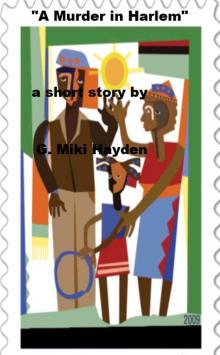- Home
- G Miki Hayden
"A Murder in Harlem" Page 2
"A Murder in Harlem" Read online
Page 2
the Asante were descended, never discussed such strange difficulties. But maybe that was because most women of her tribe had traditionally died before they entered this stage. In Miriam’s mind, she used the English word, menopause, because she couldn’t seem to find a Twi word that fit. Of course, lately, a lot of her native language had vanished from her head. Sometimes she would search for hours for a word she believed she had once known.
Being too old to bear a child was a shameful passage, she felt. Naturally enough her husband had sent for a young wife. Kofi and Miriam had no children. How could he face his own old age without a child?
Another voice in her head, the voice of the genuine Miriam, spoke up. He should have thought of that 30 years ago, the feisty voice argued. But that was a subject Miriam didn’t want to contemplate, either. What if he had taken a second bride years before? And what if they’d never come to this very interesting country?
The girl came into the kitchen. “Shall I make you a cup of tea, Mama?” she asked. The girl had never before called Miriam “Mama.” Miriam shook her head in the negative. “Shall I rub your shoulders to make you comfortable?” the girl suggested.
The girl had never offered such a thing before, either. In Miriam’s eyes this was a sure-fire sign of murderous guilt and made her feel all the more crazy because, could this really be possible?
Miriam stood up from the dining room chair. “I will go out and buy some dinner,” Miriam told Nana.
“I will go with you and carry the packages,” said the girl. This, in fact, she usually did, as Miriam had no better idea of how the girl might pass the hours of the day than to tag along with the older co-wife.
“No,” answered Miriam with great firmness. “Today I will go shopping alone.” And she picked up her purse from the table near the door, put on her jacket which hung on a hook, and—without a single word to her husband in the adjoining room—took herself out. The two of them, she thought, the two of them. They were to blame.
Though she tried to tiptoe down the stairs without arousing any notice, white policemen’s eyes followed her progression on the next flight down.
At the new giant grocery on 116th and Lenox, Miriam with great pleasure wheeled a cart through the aisles. So clean. What a beautiful place. Chicken liver and gizzards would be good for tonight’s dinner.
Adding to the relief of the distraction from her household troubles, she spotted an acquaintance, a woman from a nearby building who sometimes had a word or two to say in passing.
The two women stopped their wire vehicles and stood for an exchange of views on the world and on life in Harlem.
“I’m so sorry to hear about your niece’s beau,” said the neighbor at once in sympathy.
A shock swept straight through Miriam’s whole body. This single sentence—though she wasn’t entirely sure of the meaning of the word `beau’—confirmed the reality of her suspicions. Nana had, indeed, been mixed up with the overmuscled and flirtatious man. That girl, that Nana, had brought scandal to their house without a thought in her head. Everyone on the entire block had noticed something going on.
“She must be very heartbroken today,” added the neighbor. A touch of sympathy shined from her eyes, but curiosity was clearly mixed in her expression, too.
“Yes, she has wept for him,” Miriam agreed. “She was sad. But her involvement with the man was not so very great. She is a tender girl, however, and cried for his family.”
“The two looked very close when I saw them last night…” The woman broke off as if from some finer feeling.
“Girls,” answered Miriam. She hoped to make that single word suffice, but as she spoke it, a great anger flared up inside her at Nana for behaving badly. Miriam herself would be too shamed now to hold her head high outside her apartment. But Miriam would get over it, she decided, and she would make sure Nana redeemed herself in the eyes of West 123rd.
Russo and Sheldon, now heading on foot to Abe’s Fried Fish for some dinner, had talked to several more of the dead man’s neighbors. Even in Harlem where mistrust of the police was a great tradition, some one or two persons could always be found to backbite and tattle. The detectives had the scoop, more or less, on Adam James, who had worked as a limousine driver for the Harlem Car Service—“weddings and proms our specialty.”
“He was a womanizer extraordinaire,” concluded Russo. “A real Don Juan.”
“Cherchez la femme,” quipped Sheldon, only partway in jest. “And then look for her husband.”
“The husband,” agreed Russo. They crossed the street at Malcolm X Boulevard—well, Lenox Avenue, to the area residents. “Nude and stabbed in the back. The husband did it. Duh.”
Miriam stood and cut a big yellow onion into strips for frying. The apartment was quiet. Formerly, the silence would have been contentment itself, but, today, not knowing where the other two were, was slightly unnerving.
She tried to suppress a runaway imagination that led in a couple of disturbing directions at once. Kofi, of course, was a mild man, aside from a streak of typical male grouchiness and resistance to any comments Miriam might make. She could hardly think of him stabbing the larger more muscular male in a fit of rage. But of course maybe she didn’t know her husband at all. His taking Nana as a second wife had blindsided Miriam. And he had never really adequately explained why he had sent for the girl. So, yes, maybe he could have come at the other man with a knife, and, through sheer luck, been able to prevail in a fight.
Miriam paused and checked her knife drawer to see if one of her several implements collected over the years was missing. No, everything was in its place. Yet how awful if the very blade she cut the onion with had just last night been stained with dark red human blood. She nearly flung away the knife and was tempted to throw the onions in the garbage, but the practical habits of 50-some years of behavior prevailed. She refused to allow the thought of blood on the knife to take on a life of its own, and she continued calmly to cut the vegetable. Though when her husband entered the kitchen, she momentarily startled.
“I thought you were out selling this afternoon,” she said. Her eyes watered from the sting of the plant’s strong emanations.
“Not on the day a man in our very building has been killed and we are questioned by the police,” Kofi chided.
Of course he would try to blame her for her very reasonable assumption. But why, really, should he be so upset? “The man was not a relative,” Miriam replied.
“He died beneath our very floorboards.”
“Perhaps you saw him last night as he went in or out of the building, or as you did?” She lent a sympathetic tone to her voice.
“No, no. Why would I have seen him? I don’t even know who the man was.”
Now here was an interesting contradiction, not atypical of her husband. The dead man had lived beneath their feet yet Kofi had no idea who the man was, and still he felt too respectful to go to work to earn money for their needs. That was Kofi logic for you, and not necessarily a sure sign of guilt. Miriam put a great deal of corn oil in the pan and lit the heat low.
“Perhaps you weren’t in the neighborhood last night and have no idea who went in and out of the building,” she speculated.
“I was just outside the building, talking with some men.” He emphasized the word “men,” obviously to show her he’d had important things to do. “I told you that,” he added.
“You may have seen the killer come in or out. Perhaps you and I should go to the police. They might need to question you.”
The oil was sizzling and she tossed in the onions. She had cut them nicely in an even way. In a moment she’d throw in the gizzards and livers.
Finally, his face showed irritation. Now he might talk. “I didn’t see anyone go in or out of the building,” he rebutted. “I stood on the north side of the park under the street light and talked with some men from the Caribbean islands. Sometimes a man cannot stay in a house where women rattle, rattle, prattle.”
She knew that he had m
eant the comment to sting, and she might easily have retorted to the rattle and prattle charge since she and Nana spoke very little. More to the point, as well, he was the one who had arranged for a second wife. However, she had another focus here. “And those friends of yours would say you were with them to the police, if the police should ask?” If he had killed the man downstairs, of course he would lie to her about his whereabouts.
“I’m not from their culture. I don’t know what they’d say.” He shrugged, defeated, and left the room.
All she could deduce was that, with him standing around outside, he might well have seen Nana and the man, just as their neighbor had. And he would have seen the two being very friendly. Indeed, he might have followed them inside, up the stairs, and… And what? And taken a knife from the man’s kitchen drawer? No, not Kofi. He wouldn’t go into a stranger’s apartment and rifle through the man’s belongings. He would have first come upstairs. And once upstairs he would have settled in his chair and… would have turned on the boxing or some such and fallen asleep. Miriam sighed. Not to mention that if he was in serious trouble today, he would be crying to her with tears of desperation.
“I love fingerprints,” said Sheldon, peering at the computer on the front desk. “I love it when a crime scene yields so many of them.”
“Yes, it’s great,” Russo agreed.

 "Ebola Hemorrhagic Fever"
"Ebola Hemorrhagic Fever" "Civil Disobedience"
"Civil Disobedience" "A Murder in Harlem"
"A Murder in Harlem"